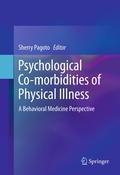
Psychological co-morbidities of physical illness: a behavioral medicine perspective
Pagoto, Sherry
Evidence for the efficacy of behavioral approaches to the treatment and management of physical illness is mounting, as is the evidence for behavioral interventions for psychological disorders. A pressing question that remains is how to effectively treat co-morbid physical and psychological illnesses. Diseases co-occur more often than not, and the co-occurrence of physical and psychological illnesses is associated with greater impairment and healthcare costs. Unfortunately, the treatment literature has traditionally been disease-specific, with fewer insights and discoveries regarding the underlying processes of co-morbid physical and psychological illnesses, and even fewer of approaches to treatment. Research on co-morbidities between physical and psychological illnesses has focused primarily on depression. Quite extensive literatures describe the negative impact of depression on type 2 diabetes, cardiovascular disease, cancer, obesity, pain, and other physical illnesses. More recently, higher ratesof physical illness have been documented in individuals with bipolar disorder, anxiety disorders, schizophrenia, and impulse control disorders. Studies emanating from the National Comorbidity Survey-Replication (NCS-R), the only U.S.population-based database that includes diagnostic information on all DSM-IV psychological disorders, have revealed strong links between a number of physical and psychological illnesses. These data draw attention to the prevalence ofphysical and psychological co-morbidities at the population level, which has stimulated research on the biobehavioral mechanisms of those co-morbidities, with the goal of developing and improving treatment approaches. As this area ofresearch grows, practical resources are needed for clinicians and researcherswho encounter individuals with co-morbid physical and psychological illnessesin their work. This book is the first to provide a comprehensive overview of psychological co-morbidities of physical illness, biological and behavioral mechanisms of those co-morbidities, and implications for treatment. Each chapterfocuses on a physical condition, such as obesity, type 2 diabetes, HIV infection, tobacco dependence, cardiovascular disease, cancer, asthma, pain, irritable bowel syndrome, autoimmune disorders, and obstetric/gynecological conditions. Chapters are structured to cover 1) the epidemiology of the most prevalent co-morbid psychological disorders within that physical condition (e.g., depression and other mood disorders, anxiety disorders, psychotic disorders, impulsecontrol disorders, and eating disorders; 2) biobehavioral mechanisms of the co-morbidity; 3) a review of the behavioral treatment literature including evidence-based practice guidelines (where available); and 4) treatment considerations including issues of stepped care, evidence-based treatment decisions, treatment sequencing, treatment blending, treatment interactions, and contraindications. Content is guided by availa First book to address psychological and medical co-morbidities from a behavioral medicine perspective. Information on assessment, treatment outcome, andtreatment decision considerations relevant to clinicians and researchers. Emphasis on evidence-based behavioral practice. INDICE: Obesity. Diabetes. HIV Infection. Smoking. Addictive Disorders. Cardiovascular Disease. Irritable Bowel Syndrome. Cancer. Asthma. Autoimmune Disorders. Developmental Disabilities. Neurological Disorders. Kidney Disease. Pain (Headache, Rheumatologic, and Orthopedic Disorders). Obstetrical and Gynecological Disorders.
- ISBN: 978-1-4419-0030-2
- Editorial: Springer New York
- Encuadernacion: Cartoné
- Páginas: 515
- Fecha Publicación: 28/10/2011
- Nº Volúmenes: 1
- Idioma: Inglés
